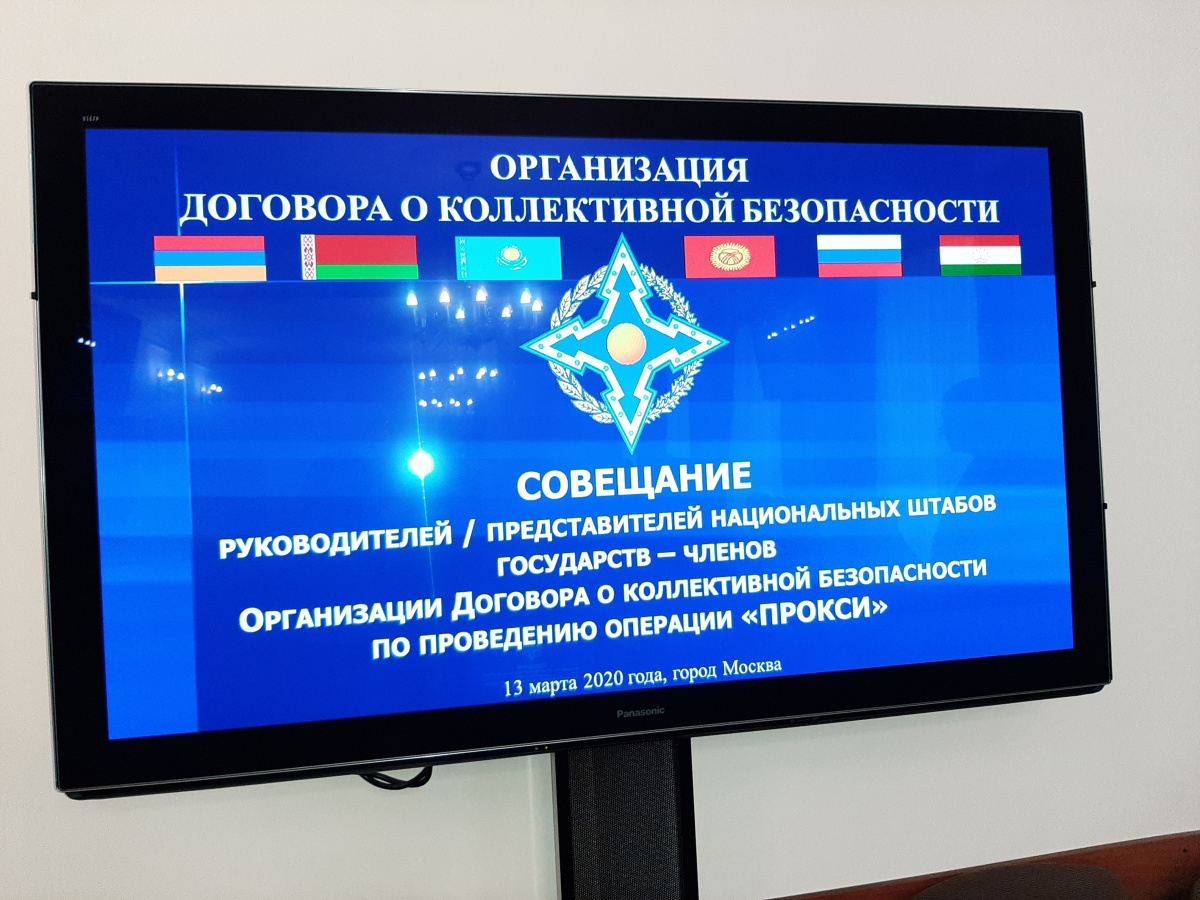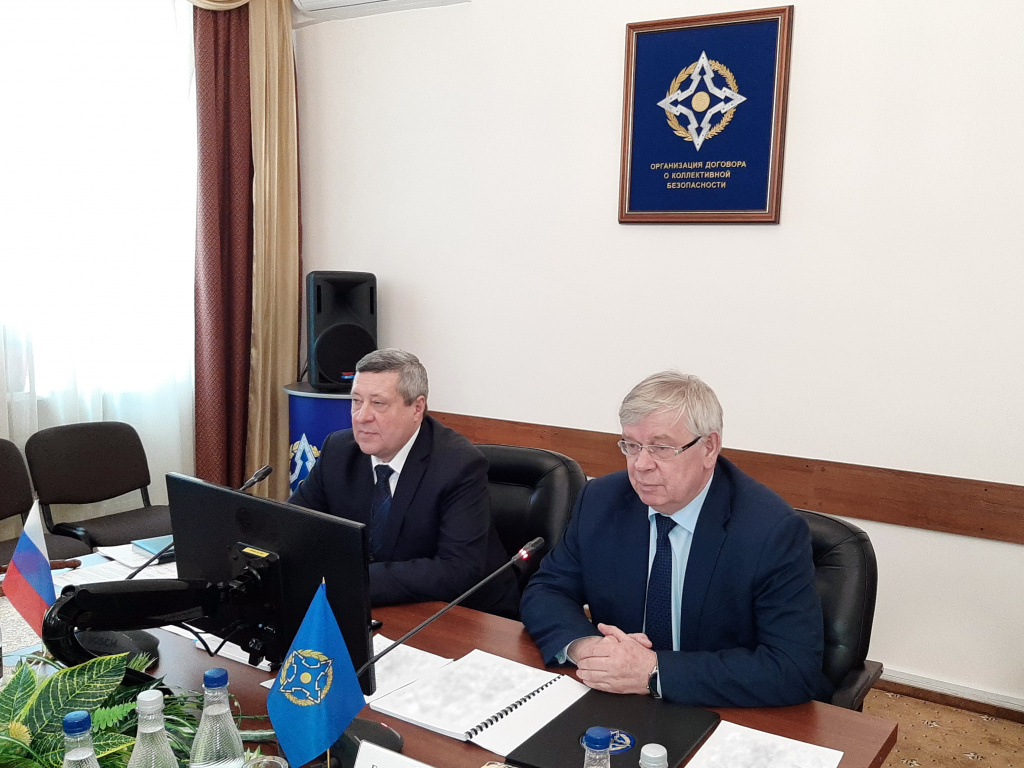On 22 April 2024, the CSTO Secretariat hosted a working meeting between the Deputy Secretary General of the Collective Security Treaty Organization, Samat Ordabaev, and the Special Representative of the UN Secretary General for Central Asia, Head of the UN Regional Centre for Preventive Diplomacy for Central Asia (UNRCCA), Kakha Imnadze.
From 22 to 26 April, this year, the CSTO Secretariat is holding an annual training meeting for representatives of ministries and departments of the Collective Security Treaty Organization member states without military status.
The meeting was held in the city of Moscow under the chairmanship of Viktor Zinoviev, Secretary of the CSTO Interstate Commission on Military-Economic Cooperation (ICMEC, Commission).
Speech of the CSTO Deputy Secretary General Valery Semerikov at the meeting of the heads of national staffs of the CSTO member states on the operation "PROXY" on March 13, 2020
 13.03.2020
13.03.2020
March 13, 2020 Moscow
Dear colleagues, our collective efforts to ensure safety and security arrangements for the infosphere of the member states of the Collective Security Treaty Organization against criminal activities and against using it for malicious purposes assigned to destabilize political-military, economic and social environment in the member states of the Organization is the most important area of the system of collective security.
The Collective Security Council of the Organization at its last in November 2019 and at a number of previous sessions in its statements more than once noted the continuing deterioration of the situation in the field of international security and the weakening of legal mechanisms to maintain it. It noted the growth of risks and threats to stability in this regard, as well as an increase in the level of conflict in various regions of the world. There is also an increase in international relations of the tendencies of attempts to solve problems by using force or threats of its use and interference in the internal affairs of states, providing targeted destructive information and propaganda influence on individual countries, and using the “double standards” policy.
Under these conditions, the CSTO Collective Security Council is once again calling on the basis of international law and the UN Charter to strengthen coordination, interaction and increased effectiveness both in countering international terrorism and related extremism, drug trafficking, illegal migration, human trafficking, and improving the quality of cooperation in combating computer crime in general and ensuring information security of the CSTO information space.
The CSTO member states advocate for the prevention of conflicts in the information sphere and the prevention of the start of an information arms race.

In conditions of total digitalization of all spheres of life, ensuring international information security becomes a determining condition for the further development of human society and, accordingly, a key factor in world politics. This is an urgent need for a new reality, due to the rapidly growing global role of information and communication technologies and the resulting new dangers and threats. Today, countering their use for military-political, terrorist and other criminal purposes is becoming an absolute priority on the agenda of the international community.
In this context, particular importance is attached to facilitating the resumption of the negotiation process on international information security within the UN with a view to working out universal agreements without which the world can plunge into “cyberhaos”. The consequences of it can be without exaggeration catastrophic.
The importance of agreeing on basic mutually acceptable principles, which in the future could form the basis for legally binding agreements by the relevant UN Open-ended Working Group and the UN Group of Governmental Experts on International Information Security. These Groups include experts from the CSTO member states, is of paramount importance.
The senior officers of member states of the Organization at the last session of the Collective Security Council have had recognized the results of the measures taken according to the CSTO "PROXY" operation on preventing hi-tech crimes.
According to the reports, number and "complexity" of cyber-attacks are increasing. And number of people involved in such criminal activities also is increasing. Hi-tech crimes are being committed every second and are a permanent threat throughout the year. Such crimes are extending beyond national borders and affect not only CSTO member states, but are affecting all over the world.
Accordingly, the damage caused is growing annually. The damage from cyberattacks, calculated in the trillions in dollar terms, has already begun to significantly affect the global economy. That is why big business “revived”. Grandiose restructuring programs of the world economy are slowed down. It is so-called "surface" damage.
In addition, there is a more significant threat that, using special techniques generated by cyber revolution in the world, even against their will, states can collide. Because these attacks are disguised as cross-border crime, they are disguised as intermediaries, as third factors.
This is what needs to be "treated" not only with "cyber hygiene", here is the problem that is global and much more complicated. One must definitely know the real source of the attack. Not only from the point of view of propaganda - this is secondary, but from the point of view of stopping the problem. And today it can be solved by only through international cooperation.
The current circumstances require positive actions, improvement and the finding new forms of mechanisms for practical interaction in the interests of protecting the information space of the CSTO member states at the regional and interstate level.
This year is defined as the year of consolidating efforts in the fight against modern challenges and threats by the senior offecers of Member States of the Organization. It is defined also as the year of improving interstate cooperation in conducting operational and preventive operations to counteract drug trafficking, illegal migration, mercenarism and combating hi-tech crimes.
This year, under the chairmanship of the Russian Federation, the Organization planned, together with the CSTO "PROXY" operation , to carry out active activities of the CSTO "Illegal" operation to combat illegal migration, the CSTO "Channel" operation, to combat drug trafficking and the anti-terrorist complex preventive measures under the code name "the CSTO" Mercenary" operation ", about which at the planning stage the senior officers of national staff for the " PROXY " operation were notified and confirmed their readiness to hold.
It is necessary to increase active interstate and interdepartmental cooperation in order to assist special units in the fight against drug trafficking, illegal migration and terrorism. It is necessary to additionally coordinate at today's meeting the mechanism for conducting targeted activities of the “PROXY-2020” operation, taking into account the existing technical and operational capabilities.
The CSTO Secretariat, on the eve of this meeting, received a number of proposals to increase the efficiency of the operation and use the available reserves, primarily organizational ones. These reserves will form the basis of discussions by the heads of national staffs on "PROXY" operation and the development of collective decisions.
The meeting is attended by the CSTO Secretariat's Challenges and Threats Management Department staff members, responsible for the coordination component in the areas of “Illegal”, “Channel” and “Mercenary”operations planned for the CSTO. These staff members are provided an opportunity to speak before discussing the agenda of the meeting.
The main priority areas of this year cooperation are:
- exchange of information and joint activities to combat the illegal activities of international hacker groups involved in the development of software designed for unauthorized access to computer information;
- countering illegal activities related to drug trafficking and the use of the Internet for drug trade and drug trafficking,
- counteraction to terrorist and extremist activities carried out using information and communication technologies.
Once again, I want to emphasize that the operation should remain an effective tool for collective cooperation.
There is great hope and confidence that our joint actions within the framework of the "PROXY" operation to counter attempts to use the information technology sphere for criminal purposes will help strengthen the collective security of the CSTO member states.










